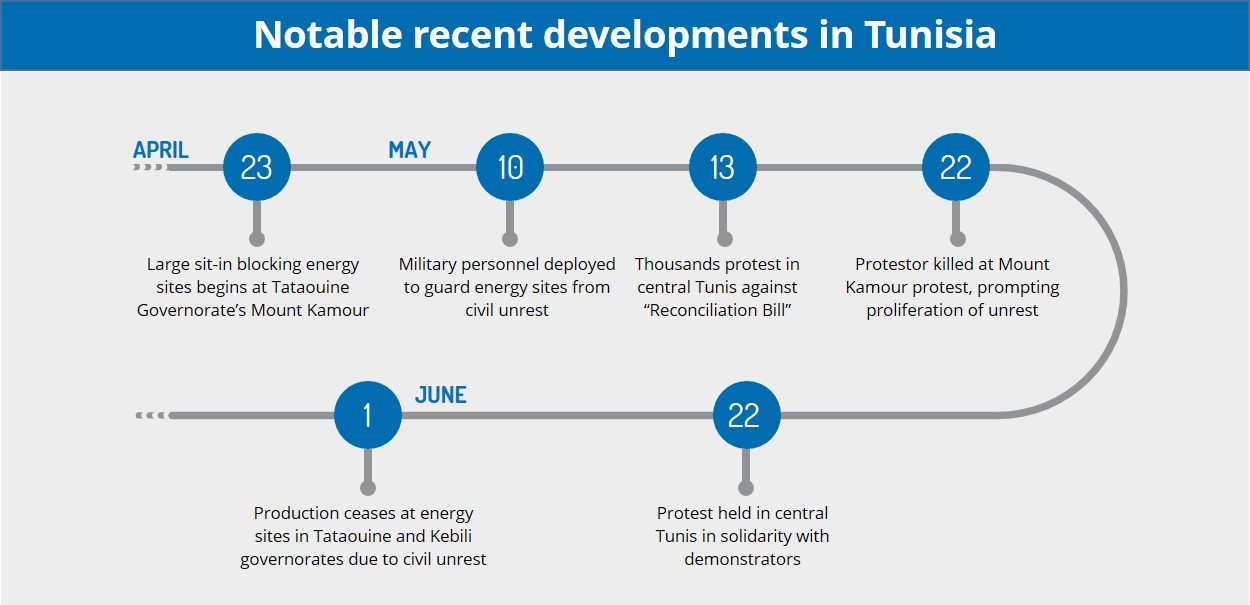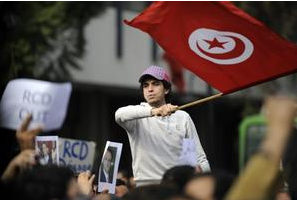Current Situation:
In recent weeks, there has been an uptick in incidents of civil unrest in Tunisia, mostly in outlying southern areas, which has resulted in service disruptions at energy projects. These events culminated in the stoppage of oil and gas production at fields in Tataouine and Kebili governorates on June 1 due to ongoing protest activity at these sites, as announced by Tunisia’s official news agency.
This particular stretch of protests effectively began on April 23, when thousands of local citizens commenced a sit-in near Tataouine Governorate’s Mount Kamour, which remains ongoing at the time of writing. In this demonstration, the participants are demanding the provision of employment opportunities to the local populace at the oil facilities in the area and have been obstructing access to the oil infrastructure. The protesters are also calling for the nationalization of Tunisia’s resources to prevent foreign companies from contributing to the formers’ “marginalization”.
Meanwhile, protests at similar industrial projects have proliferated in numerous areas of southern outlying Tunisia. To protect these sites from civil unrest, Tunisian Armed Forces (TAF) personnel were deployed to production installations throughout the region by President Beji Caid Essebsi on May 10. In addition, developments at Mount Kamour on May 22 provided further momentum to this wave of demonstrations, as a protester was killed after being hit by a security vehicle during protesters’ attempt to storm an oil installation. This protest was dispersed with tear gas by security forces, after which demonstrators tried to forcibly enter the Tataouine Governorate headquarters, and to burn down local police stations. Moreover, a number of the additional demonstrations that followed this incident were also broken up with force.
In response to these incidents, aside from the staging of additional gatherings in southern Tunisia, a large demonstration materialized in central Tunis in front of the French Embassy to denounce the death of the protester and to express solidarity with the Mount Kamour demonstrations. Some of the protesters reportedly threw projectiles at security forces posted to the demonstration, including rocks, glass objects, and chairs. Moreover, the protesters called for the nationalization of Tunisia’s resources and the expulsion of foreign businesses, stating that international companies such as those from France are “exploiting and impoverishing the State.”
Meanwhile, on May 13, thousands of activists marched along central Tunis’ Habib Bourguiba Avenue to denounce a proposed “reconciliation bill” initiated by President Essebsi, which would grant amnesty to approximately 400 businessmen linked to the ousted President Zine al-Abidine Ben Ali and who are facing corruption charges.
Assessments
Though instances of civil unrest in Tunisia’s rural areas are recorded with relatively high frequency, these latest developments, especially the events at Mount Kamour, are particularly notable, given their wide participation, their long duration, as well as for the violence recorded at some of the demonstrations. These incidents further highlight the wide view prevailing among those residing in Tunisia’s outlying areas of their perceived marginalization by authorities, whom they see as ambivalent to their capacity to earn a livelihood and to the conditions under which they live. Furthermore, despite pledges by authorities to create employment opportunities and commence development programs in outlying areas, they have thus far been unable to fulfill past promises. This precedent is liable to have prompted a sizeable number of the participants at Mount Kamour to continue their protest. Moreover, the forcible dispersals of these demonstrations are liable to have hardened citizens’ sense of marginalization.
Furthermore, in light of the cessation of production at oil and gas fields in Tataouine and Kebili Governorates on June 1, such instability at sensitive economic projects carries the potential to deter foreign companies from operating in Tunisia and from investing capital in the country, which would sustain significant revenue losses to the Tunisian state, and deprive it of the capital requisite to revive the national economy. Additionally, protestors’ demand for nationalization of the country’s resources indicates an anti-foreign sentiment regarding international commercial activity in the country, which protesters view as benefiting foreign interests in cooperation with authorities, perceivably at the expense of Tunisian citizens. Thus, this view provides further impetus for staging civil unrest at projects run by foreign industry, which will likely prolong these interruptions in production. Furthermore, the spread of these protests from outlying Tunisia to Tunis indicates sympathy among the latter’s residents with those of the former, particularly given the overall poor state of the national economy, which naturally also affects all citizens.
Contributing to this overall sense of economic disenchantment is the “reconciliation bill” initiated by President Essebsi. This proposed legislation is likely being pursued at this time given its potential to aid the Tunisian economy, as past measures aimed towards this desired effect have not been met with success thus far. With this in mind, authorities likely perceive that through the passing of this bill, large sums of capital that had been acquired through illicit means can be inserted into the Tunisian economy and thus provide it with a significant boost. Furthermore, by way of the stipulations in this bill, government leadership can reconcile with Tunisia’s business community, as the commercial activity of the latter, which includes accomplished veteran figures of Tunisian commerce, could be beneficial to the national economy. Thus, authorities likely perceive this bill as a novel strategy towards fostering economic growth, in lieu of the austerity measures that they have been unable to adopt.
That said, as evidenced by the large demonstration held to protest this bill in central Tunis on May 13, these efforts by authorities have aggravated the sentiments of the population, who likely perceive Tunisia’s democratic transition as stagnating, and even degenerating to that of the ben Ali era. Overall, this is likely due to the fact that much of Tunisian civil society sees a reconciliation with ben Ali-era businessmen as a significant step backwards, as much of the revolutionary activity of large segments of civil society during the 2010-2011 demonstrations were organized to denounce the corruption of ben Ali. Thus, various sectors of Tunisia’s populace are liable to discern a responsibility on their part to protest against this proposed legislation, and in turn, preserve the stated principles of the Tunisian revolution, which includes transparency on the part of public officials.
Furthermore, aside from seeing this legislation as sanctioning corruption, given that this bill was initiated by Essid, himself a former ben Ali official, this legislation is likely widely viewed as Essid’s sustaining of ben Ali’s corruption, thus damaging his public credibility, and that of government leadership. Regardless, authorities are likely pursuing this legislation as a last resort, as they see few alternatives towards improving Tunisia’s economy. The same can be said for the deployment of TAF personnel, who were posted to energy production sites despite the backlash liable to have been anticipated by authorities.
These are the prevailing circumstances despite the ascendance of Prime Minister Youssef Chahed, who was nominated in August 2016 on a platform of economic recovery and development initiatives. Thus, challenges posed to authorities in remedying these issues largely stem from difficulties in passing much-needed austerity measures and reforms in public expenditures, which could to lend to economic growth, due to public reaction against such legislation. Taken as a whole, the unrest that is proliferating throughout Tunisia, as well as potential further public reaction to the proposed reconciliation bill, will likely lend to further instability in the country, including through the disruption of vital industrial projects. While there is no indication that the country is headed to the level of volatility seen during the country’s period of revolutionary upheaval in the earlier part of this decade, recent events indicate that the conditions that led to these events remain.
Forecast
Given the government’s inability thus far to foster growth in the economy and the jobs sectors, as well as the widespread public sense of dissatisfaction, additional protests will likely be witnessed in the coming days and weeks. The majority of these will likely materialize in outlying Tunisia, some of which are liable to feature further civil unrest and forcible dispersals, and will cause additional service disruptions at energy sites, while protests related to these issues will also likely be recorded in Tunis and other major Tunisian cities. Furthermore, in light of this climate of protest, seeing no recourse towards boosting the economy, authorities will likely pursue the Reconciliation Bill and other legislative measures largely viewed as negative by the public, which will also be met with protests. In turn, this will perpetuate the ongoing cycle of economic stagnation and civil unrest.
Recommendations
Travel to Tunis may continue while adhering to all security precautions regarding militancy and civil unrest. Those operating or residing in Tunisia are advised that we maintain operational capabilities in the country. Contact us at [email protected] or +44 20-3540-0434 for itinerary and contingency support options.
We currently advise against nonessential travel to outlying towns and cities in Tunisia, due to the lack of travel and tourist infrastructure and a heightened risk for civil unrest. Those operating in Tunis are advised to avoid nonessential travel to the al-Intikala, Le Kram, Ettadhamen, Ibn Khaldoun, Ennasr, Ariana, Bab el-Khadra, Mornaguia, and Manouba Districts of the capital, due to the potential for civil unrest in these areas. Furthermore, those conducting business at oil and gas fields in Tataouine and Kebili governorates on are advised to compensate for anticipated delays in operations over the coming days and weeks due to the protests at these sites, and the resultant stoppages of production at the facilities, as well as to remain cognizant of possible further cessations of production at energy projects in other governorates.


